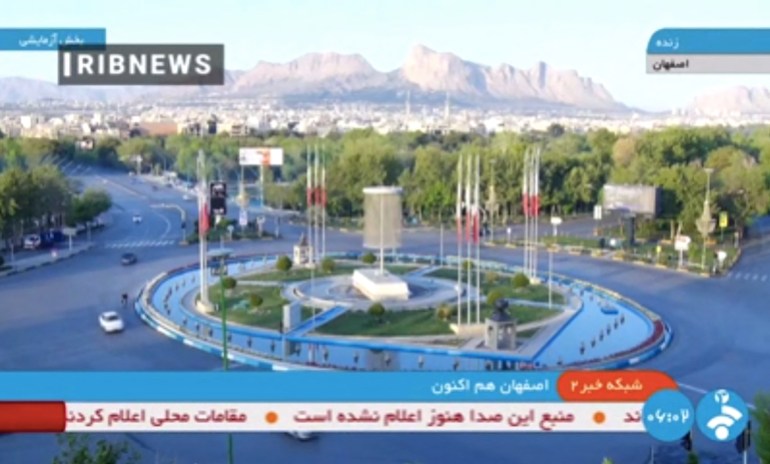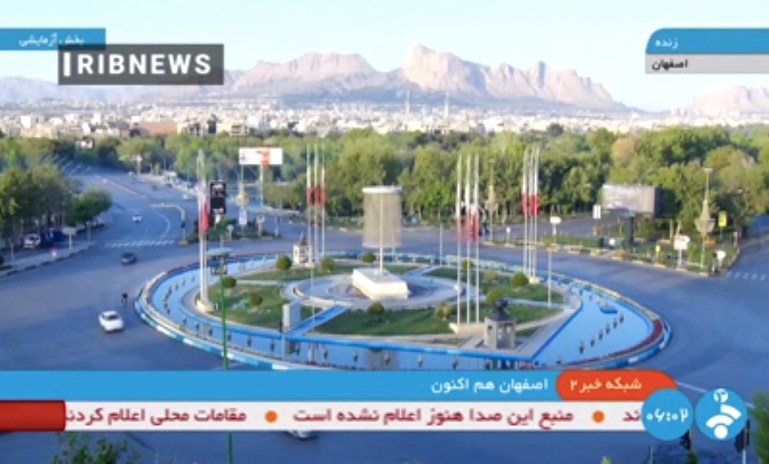Tehran, Iran – Iran says it has shot down three quadcopters launched inside its territory and news reports say there have been explosions at some military sites in Syria – taken as indications that Israel has responded to Iran’s missile and drone attacks on its soil last week.
Iran said it shot down the quadcopters in the central province of Isfahan, where there are military bases, as well as the country’s main nuclear facilities at Natanz.
However, the International Atomic Energy Agency (IAEA) confirmed that Iran’s nuclear sites were untouched.
For several hours, there were conflicting reports as the United States said there had been an Israeli missile attack while Iran said there had been no missiles, only some small craft that had been shot down, and Israel said nothing.
Sharpening rhetoric
This came a day after the Islamic Revolutionary Guard Corps (IRGC) said it would respond in kind if Israel attacked Iranian nuclear sites, adding that it may also shift its stance on nuclear bombs.
On Thursday, Brigadier General Ahmad Haghtalab, head of IRGC Nuclear Command, established after sabotage attacks on nuclear facilities blamed on Israel, said Tehran identified Israeli nuclear sites and has “fingers on the trigger” to launch another major attack.
IAEA can confirm that there is no damage to #Iran’s nuclear sites. DG @rafaelmgrossi continues to call for extreme restraint from everybody and reiterates that nuclear facilities should never be a target in military conflicts. IAEA is monitoring the situation very closely. pic.twitter.com/4F7pAlNjWM
— IAEA – International Atomic Energy Agency ⚛️ (@iaeaorg) April 19, 2024
He also suggested it would be “likely and imaginable” for Iran to reconsider pursuing a nuclear weapon if its nuclear facilities were targeted.
Iran’s attack last week was a well-telegraphed and near fully averted retaliation for Israel’s suspected bombing of the Iranian consular building in Syria that killed seven IRGC personnel, including two generals.
Operations “exceeded expectations”, the IRGC said, as some ballistic missiles punched through layers of defences mounted by Israel and its allies.
Before the Israeli attacks on Friday morning, Iran had bolstered its defences, including at nuclear facilities.
On Sunday, the Iranian government told the IAEA that all nuclear facilities subject to inspection would be closed for one day for “security considerations”, IAEA head Rafael Grossi told reporters the following day.
Friday’s attack was close to Natanz, and Israel has successfully launched high-profile sabotage attacks on Iranian nuclear facilities before, but would it go as far as launching a direct attack on an Iranian nuclear facility?
At least under the current circumstances, the answer is most likely no.
Would a strike on nuclear sites even be possible?
For one, there are tactical military considerations.
Israel would most likely have to carry out such an attack alone as the US, which helped repel Iran’s attack, has cautioned it will not actively participate in an attack on Iran and has demonstrated that on Friday.
This has come after strict warnings from Tehran to Washington to keep clear – messages delivered publicly and officially.
Shortly after Iran’s attack on Israel, Tehran took the unprecedented step of summoning the Swiss envoy – the representative of Washington’s political interests in Iran – not to the Ministry of Foreign Affairs as is the norm, but to the IRGC, to warn against any attack.
In the absence of US military backing, Israel would be alone in trying to get through layers of Iranian air defences to reach facilities that are underground or buried deep in the mountains.
At Natanz where Iran’s main nuclear facilities are located, satellite images have shown progress being made in constructing a new underground site that could hold uranium enrichment halls and other facilities.
At an estimated 100 metres (328 feet) below the ground, it is so deep that even the US-made bunker buster bombs that Israel has been using in Gaza to devastating effect will likely fail to damage it.
Iran’s nuclear programme and attempts to cap it
Israel says the world must do everything possible to ensure Iran never gets a nuclear weapon and has even promised direct military action to stop that from happening.
Iran has always maintained that it does not seek a nuclear bomb.

It ramped up its nuclear activity starting in 2018 after the US unilaterally abandoned the 2015 nuclear deal – now in tatters – with world powers that capped Iranian uranium enrichment at 3.67 percent in exchange for sanctions relief.
Construction on the new site at Natanz started in response to a 2020 sabotage attack. In 2021, Iran took uranium enrichment up to 60 percent, days after a sabotage attack on Natanz that Tehran blamed on Israel.
The IAEA says Iran has the materials required for several bombs but that, based on inspections, it has not started on a bomb. The IAEA said in its last quarterly report that Iran has slightly slowed the pace of its 60 percent enrichment since the end of last year.
A direct Israeli strike on Iranian nuclear facilities would contradict Israel’s rhetoric about Iran’s nuclear capabilities in that it would only push Iran to a more drastic course of action, which could include reconsidering a bomb and pulling out of the Nuclear Nonproliferation Treaty.
Even in a scenario where Israeli jet fighters manage to punch through Iranian air defences to reach Natanz or another top nuclear facility – which could also entail an environmental disaster – there is no guarantee what they will achieve.
Iran has been making strides in its nuclear research and development since the 2018 US withdrawal – a body of knowledge that cannot be destroyed by bombs or by assassinating individual scientists or project managers.
Severe, unpredictable ramifications
An Israeli strike on Iranian nuclear facilities would be a de facto declaration of war as it would constitute a full-fledged military assault on one of the highest-valued Iranian state facilities.
This new level of escalation would be even higher than the levelling of Iran’s consulate in Syria, itself an unprecedented violation of international law, which seemed to start the current cycle of attack and response.
It would not only force Iran’s hand to mount an even stronger military response, but it would likely also spring the “axis of resistance” of Iran-aligned groups in Iraq, Lebanon, Syria and Yemen to the highest level of action against Israel since the start of the devastating war on Gaza.
Facing growing international condemnation for the war on Gaza, Israeli officials would also find it extremely difficult to justify a direct assault on Iran, especially on nuclear facilities, at the UN, which would test the boundaries of “ironclad” support from their Western allies.
This while the Israeli army is already stretched by the combined strain of its military campaign in Gaza and border fighting with Hezbollah.
It also would remain to be seen whether the attacks would be directed solely at Israel, as Tehran has repeatedly warned that it would also hold the US, and any regional countries who cooperate with Israel, responsible for any major strikes by Israel.
That would expose the entire region and beyond to significantly expanded military conflict, if not all-out war.
Read More: World News | Entertainment News | Celeb News
Aljazera










